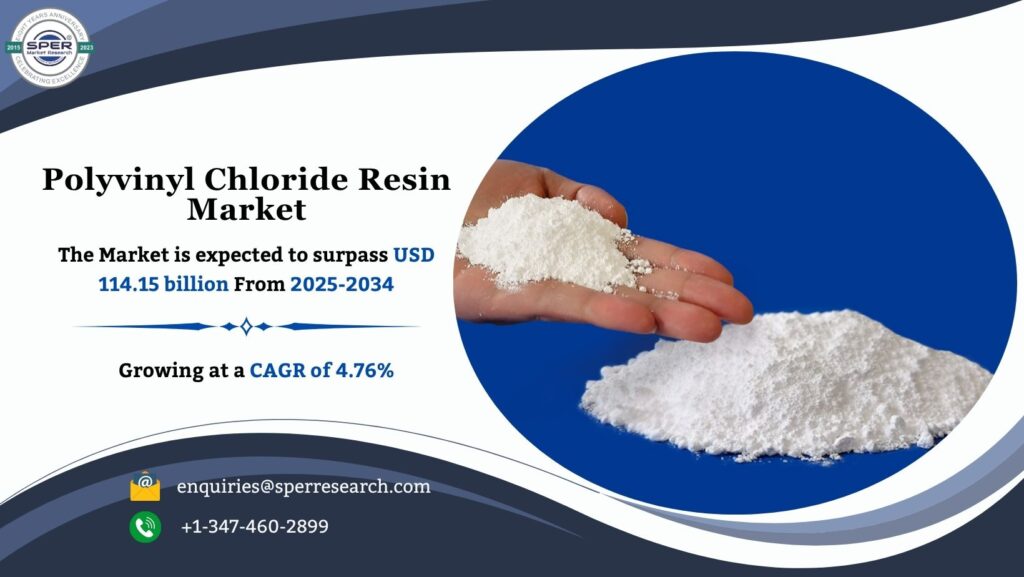
Vinyl chloride monomers are polymerized to create polyvinyl chloride (PVC) resin, a synthetic plastic polymer. It is one of the most widely used polymers in the world due to its strength, chemical resistance, and versatility. As PVC resin is easily molded into rigid or flexible forms, it can be used in a variety of industries, including packaging, healthcare, automotive, and construction. While stiff PVC is commonly used for pipes, window frames, and profiles, flexible PVC is used in cables, flooring, and medical devices. It is widely used in both industrial and consumer markets due to its low cost, lightweight design, and extended service life.
According to SPER market research, ‘Global Polyvinyl Chloride Resin Market Size- By Type, By Application, By End-use Industry – Regional Outlook, Competitive Strategies and Segment Forecast to 2033’ state that the Global Polyvinyl Chloride Resin Market is predicted to reach 114.15 billion by 2034 with a CAGR of 4.76%.
Drivers:
The market for polyvinyl chloride (PVC) resin is fueled by the variety of industries in which it finds use. PVC is a popular material for pipes, window frames, and flooring in the building industry because of its affordability and longevity. Because of its lightweight and adaptable qualities, PVC is used in the automotive sector for wire insulation, door panels, and dashboards. Furthermore, PVC’s superior barrier qualities, which make it appropriate for flexible packaging films and containers, assist the packaging sector. Nevertheless, the market is constrained by factors including environmental concerns about harmful emissions during manufacture and disposal, which result in strict regulations. Market expansion is further hampered by fluctuating raw material prices, particularly those of ethylene, and competition from substitute materials like polyethylene and biodegradable plastics.
Request a Free Sample Report: https://www.sperresearch.com/report-store/polyvinyl-chloride-resin-market?sample=1
Restraints:
There are a number of major obstacles facing the global polyvinyl chloride (PVC) resin industry. Environmental issues related to the manufacture and disposal of PVC are the most pressing. Dioxins and other pollutants released throughout the production process are harmful to human health and the environment. Furthermore, PVC is not biodegradable, which means it will persist in ecosystems for a long time and may contaminate soil and water supplies. Strict regulations have been put in place by regulatory agencies, especially in North America and Europe, to lessen these environmental effects, which may limit production capabilities. In addition, the market faces price volatility for raw materials, particularly chlorine and ethylene, which can interfere with production scheduling and profitability.
China holds a dominant position in the global polyvinyl chloride (PVC) resin market, driven by its substantial production capacity and extensive domestic consumption. Some significant market players are Braskem, Chemplast Sanmar, Cires, INEOS, LG Chem, Mitsubishi Chemical Corporation, SCG Chemicals, Shin-Etsu Chemical, and Solvay.
For More Information, refer to below link: –
Polyvinyl Chloride Resin Market Growth
Related Reports:
Follow Us –
LinkedIn | Instagram | Facebook | Twitter
Contact Us:
Sara Lopes, Business Consultant — USA
SPER Market Research
enquiries@sperresearch.com
+1–347–460–2899





